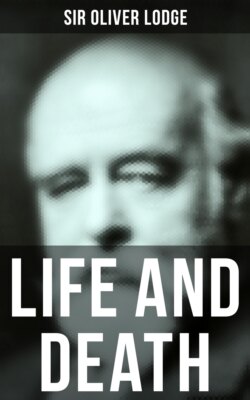Читать книгу Life and Death - Sir Oliver Lodge - Страница 7
На сайте Литреса книга снята с продажи.
EXTRACTS FROM PLATO'S DIALOGUE
"MENEXENUS"
ОглавлениеTable of Contents
Being part of a Speech in honour of those who had
died in Battle for their Country
AND I think that I ought now to repeat the message which your fathers, when they went out to battle, urged us to deliver to you who are their survivors, in case anything happened to them. I will tell you what I heard them say, and what, if they could, they would fain be saying now, judging from what they then said; but you must imagine that you hear it all from their lips. Thus they spoke:—
"Sons, the event proves that your fathers were brave men. For we, who might have continued to live, though without glory, choose a glorious death rather than bring reproach on you and your children, and rather than disgrace our fathers and all of our race who have gone before us, believing that for the man who brings shame on his own people life is not worth living, and that such an one is loved neither by men nor gods, either on earth or in the underworld when he is dead.
"Some of us have fathers and mothers still living, and you must encourage them to bear their trouble, should it come, as lightly as may be; and do not join them in lamentations, for they will have no need of aught that would give their grief a keener edge. They will have pain enough from what has befallen them. Endeavour rather to soothe and heal their wound, reminding them that of all the boons they ever prayed for the greatest have been granted to them. For they did not pray that their sons should live for ever, but that they should be brave and of fair fame. Courage and honour are the best of all blessings, and while for a mortal man it can hardly be that everything in his own life will turn out as he would have it, their prayer for those two things has been heard. Moreover, if they bear their troubles bravely, it will be perceived that they are indeed fathers of brave sons, and that they themselves are like them. … So minded, we, at any rate, bid those dear to us to be; such we would have them be; and such we say we are now showing that we ourselves are, neither grieving overmuch nor fearing overmuch if we are to die in this battle. And we entreat our fathers and mothers to continue to be thus minded for the rest of their days, for we would have them know that it is not by bewailing and lamentation that they will please us best. If the dead have any knowledge of the living, they will give us no pleasure by breaking down under their trouble, or by bearing it with impatience. … For our lives will have had an end the most glorious of all that fall to the lot of man; it is therefore more fitting to do us honour than to lament us."
Stat sua cuique dies; breve et irreparabile tempus
Omnibus est vitae: sed famam extendere factis,
Hoc virtutis opus.
�n. x. 467
Footnotes
[1] Swinburne, _Super Flumina Babylonis_.
[2] Note by O. J. L.—A volume of poems by O. W. F. L. had been sent to Raymond by the author; and this came back with his kit, inscribed on the title page in a way which showed that it had been appreciated:—
"Received at Wisques (Machine-Gun School), near St. Omer,
France—12th July 1915.
Taken to camp near Poperinghe—13th July.
To huts near Dickebusch—21st July.
To first-line trenches near St. Eloi, in front of 'The Mound of
Death'—24th July."
